Ways Duke Colleagues Beat Stress with Hobbies
Pastimes fight burnout and bring relief from pandemic challenges
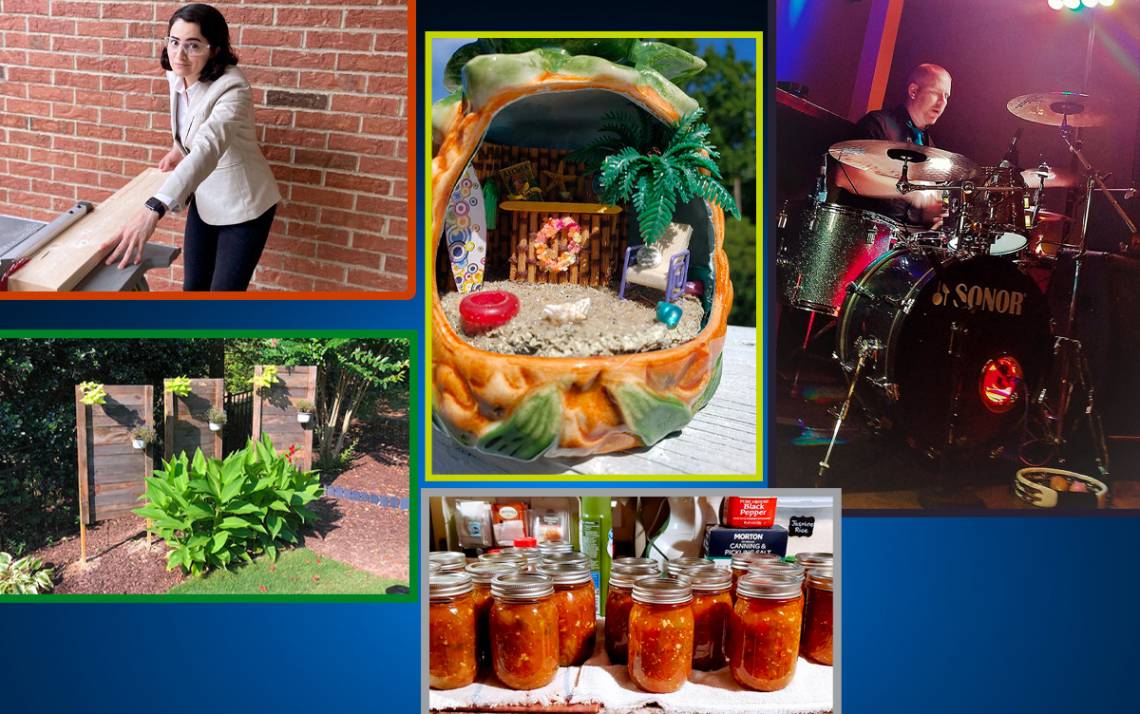
During the pandemic, Helen Cuccaro has developed an eye for repurposing materials and turning them into something new.
After she and her husband resodded their backyard last summer, Cuccaro deconstructed the leftover grass pallets and used the wood to build privacy panels for her garden. When one of her friends saw the completed project, they asked her to create privacy panels for them too.
Over the past two years, reusing materials such as leftover tiles to make an epoxy table have helped Cuccaro relieve stress.
“It’s hard work, but it’s very relaxing,” said Cuccaro, an administrative coordinator in the Duke School of Medicine Office of Human Resources. “It calms me, and I just like it. It makes everything look so much prettier.”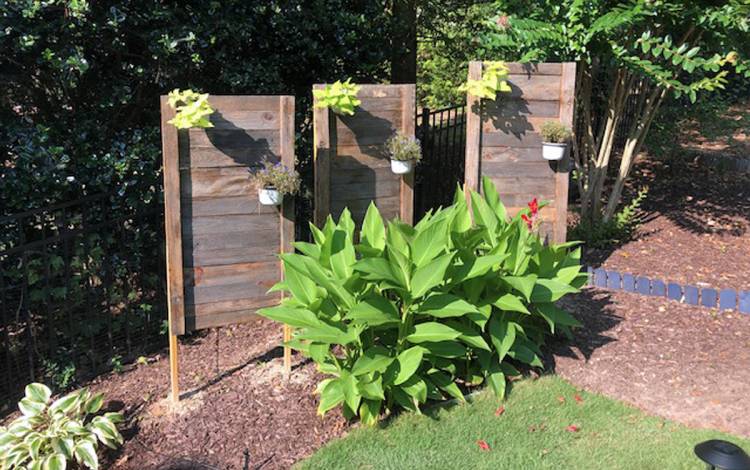
The pandemic has proven to be a stressful time at home and work across the country. Nationally, one fifth of U.S. adults have felt high levels of psychological distress, according to a 2021 survey from the Pew Research Center. Many people feel overwhelmed and physically or emotionally exhausted. But with more time at home, hobbies have taken on an important role. Online searches for hobbies surged during the pandemic, increasing by about 400 percent in the United States in May 2020, according to the World Economic Forum.
For Duke colleagues, creative hobbies have been an outlet to fight stress, foster healing and better balance work and life.
“It's a really great way to reconnect with yourself, with everything externally that's going on with this you lose track of who you are and what's important or valuable to you,” said Najla McClain, a fulfillment and purpose co-convener for Healthy Duke. “To have a hobby to go to reconnect and identify what brings you joy is extremely important.”
Fruits of their labor
Tammy Kim grew up on a dairy farm in Hillsborough and Patty Hight in Raleigh with a farming heritage in Granville County. Now, as Duke employees, they share a hobby together: canning fruits and vegetables near Kim’s family farm.
They met at Duke in 2012 and bonded over their common interest; they’ve been canning and freezing together ever since.
Using produce from their gardens or local farms, Hight and Kim return to Hight’s kitchen to cut, prepare and preserve fruits and vegetables. Over the past year, the fruits of their labor have produced hundreds of cans of jellies, apple sauce, salsa, relishes, pickles and more.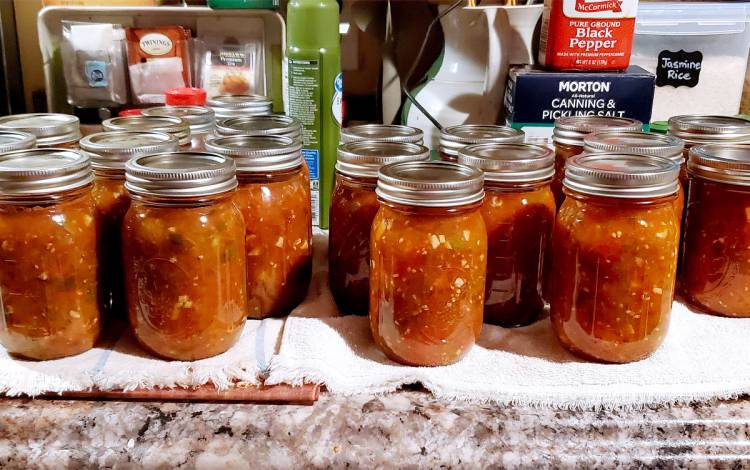
“We both do very detailed financial analytical-type jobs, but what we enjoy the most is just the simple pleasures, stuff that we learned from our mothers, aunts and grandmas,” said Hight, grants and contracts manager in the Duke Department of Physics.
The pastime provides an opportunity for them to recenter and forget about other responsibilities.
“It’s such a relief,” said Kim, an administrative manager in Anesthesiology Business and Support Services. “Compared to the sedentary grants and contract work, we get to stand up most of the day, spend time in the outdoors, laughing, picking, lifting, canning, and with no deadlines.”
‘Almost like going into a fairytale’
Sitting near a big window in the craft room at her house in Graham, Debra Moorehead-Washington gets lost in crafting for hours. After returning home from work or on weekends, the room filled with fabric, sewing machines and unfinished projects is her refuge.
As a miniaturist, a hobby she picked up from a woman she met while living in Germany, Moorehead-Washington uses small items and kits to create quarter inch to one-inch scenes of recreated rooms and places that she displays in small plastic cases around her house. Household items help her turn an idea into a real-life scene on a miniscule level. For instance, a toothpaste cap could become a trashcan or a lampshade in a scene.
Over the years, Moorehead-Washington has created a Tuscany villa, a roaring-20s scene and a fruit stand, which won her first prize at the 2001 Southern Christmas Show in Charlotte.
“It takes me away from real life, the reality of life,” said Moorehead-Washington, a triage nurse with Ambulatory Telephone Triage Services. “It’s almost like going into a fairytale. That’s why my crafts are my happy place.”
The benefit that Moorehead-Washington is describing is flow, a focused state of engagement on an enjoyable task when everything else going on melts away. Studies on flow have shown that it can slow your heart rate, decrease breathing and help you relax.
“I can just immerse myself in it and by the end of the day, I either have accomplished a project or I’m on my way to accomplishing a project,” she said. “It’s something that I can say I’ve made with my hands, and it’s finished.”
Connecting through music
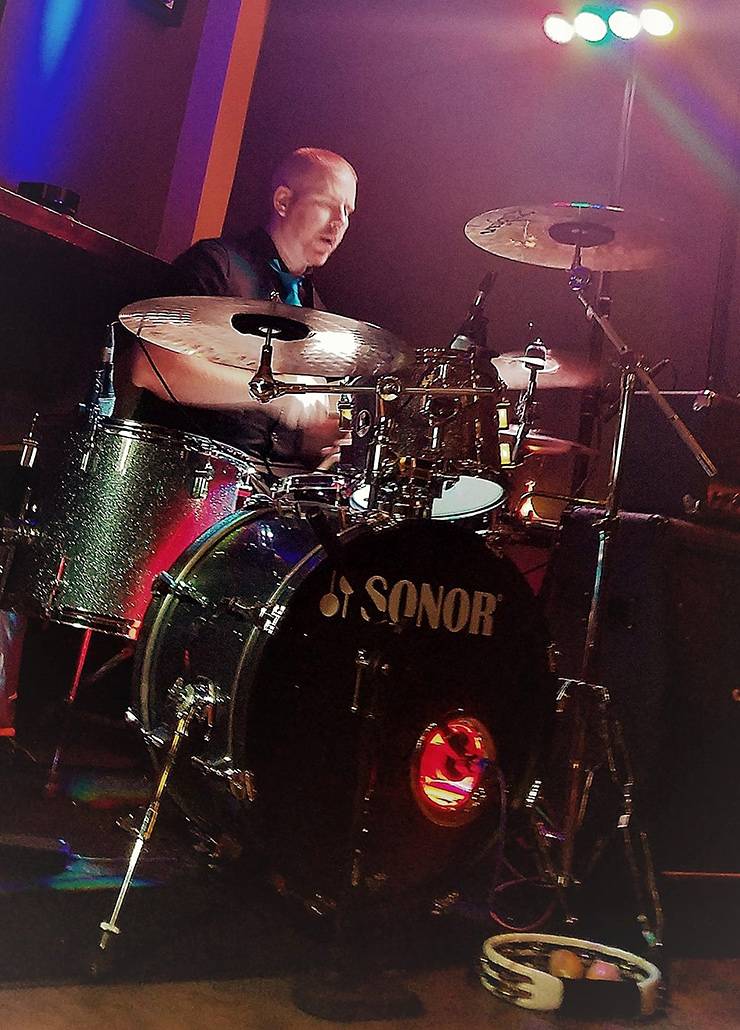
As a community relations officer for the Duke University Police Department, Daryl Mount works with students, staff and faculty on campus. Several years ago, with two other business partners, Mount started Honeymooners Productions, a DJ service entertainment company for weddings and other events. He also plays drums in the band, “On the RoCks.”
For Mount, playing the drums and serving as a DJ helps him bring joy to people. When he returns to work, he feels positive and light.
“I just love putting smiles on people's faces and entertaining them, no matter what it is,” Mount said. “No matter what the event is for, it's just bringing everyone together. Music does that to people.”
A passion for woodworking
Though she was woodworking before COVID-19, Stefanie Resillez’s passion for making her own furniture has become much more important to her during the pandemic.
When she moved into a two-bedroom apartment this year, she decided to build all the furniture to furnish it. She taught herself the processes through YouTube videos, making pieces like a dining room table, a TV center, two queen bed frames, a coat rack, mudroom shoe rack and bench with her own hands inside a garage.
“I’ve definitely found a passion in it,” said Resillez, a coordinator for volunteer services in pediatrics.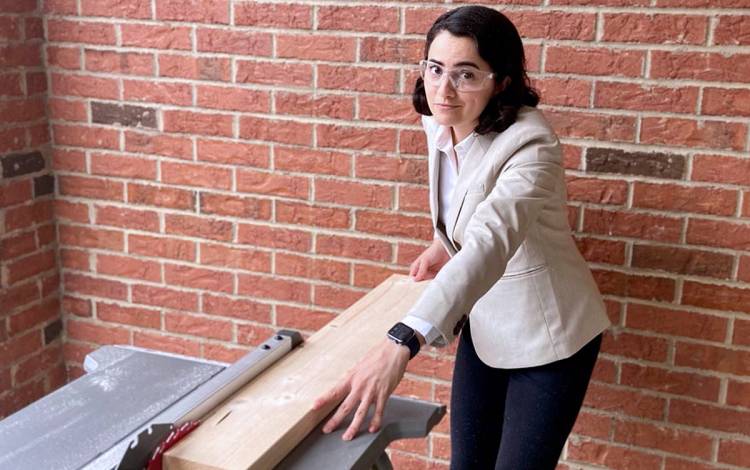
Since vaccination sites opened at Duke, Resillez has helped coordinate non-clinical volunteers at sites. With a busy schedule, feeling a sense of accomplishment from woodworking helps her let go of stress.
“It’s not a hobby that’s very soothing,” Resillez said. “I’m a detail-oriented person, and the level of focus helps to clear my mind. The outcome turns it into a functional art piece of some sort. That’s why I enjoy it.”
Send story ideas, shout-outs and photographs through our story idea form or write working@duke.edu.